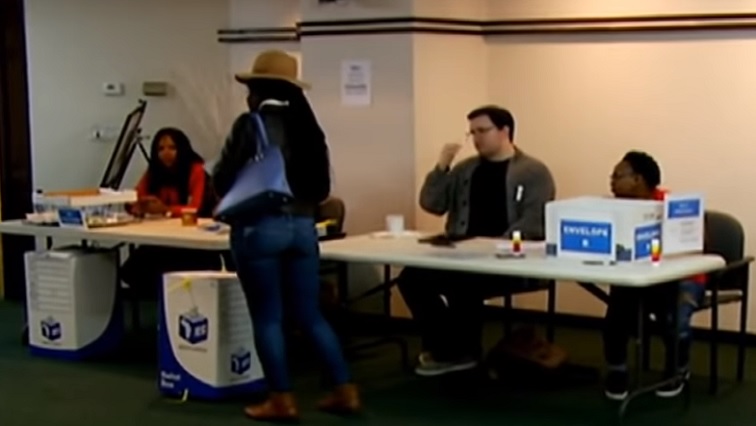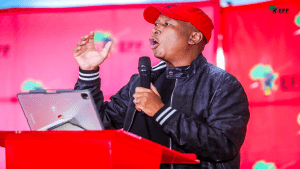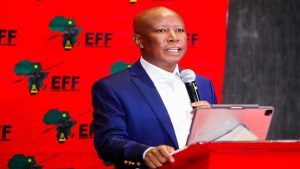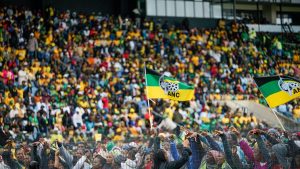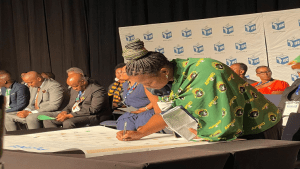The end of 2019 also marks the end of a decade and it has been a busy one for South African politics.
A number of political parties were formed, with some managing to grow in leaps and bounds, while others fell by the wayside as they lost their seats in Parliament.
During the May general elections, the Independent Electoral Commission (IEC) announced that a total of 48 political parties registered to contest the elections.
Most of them were formed recently, suggesting an opportunity to capitalise on voter uncertainty; however, they failed to meet the threshold to make it to Parliament. However, others are still soldiering on. One party that seems to be doing well is the Economic Freedom Fighters (EFF).
The party was founded by Julius Malema, together with his deputy Floyd Shivhambu in 2013, after their expulsion from the governing African National Congress. Against all odds, the EFF became the third largest parliamentary party, with over 1 million votes and 25 seats in the National Assembly in the first national elections the party contested, in 2014.
It nearly doubled its presence in Parliament with almost 2 million votes and 44 seats after this year’s general elections. During the party’s National People’s Assembly held recently, almost 4000 delegates renewed Malema’s mandate as president and Shivhambu as his deputy.
“My simple thing of being elected unopposed or all the time elected unopposed is very simple, I work very hard, I don’t take anything for granted, you give it to me I will work on it and perfect it. I pay attention to the smallest detail. I know everything that is happening at this conference, smallest detail even if you want to hate me you will come to accept that no but it does not matter what we think of him so I am not a dictator I am a hard worker,” says Malema.
Another party that splintered from the African National Congress (ANC) is the Congress of the People (COPE), formed end of 2008 after its leader Mosiuoa Lekota left the ANC in protest over the ousting of former President Thabo Mbeki.
COPE received more than 1.3 million votes when it first contested elections in 2009.
However, the party’s promising start quickly lost momentum due to a bruising leadership battle between Lekota and his former deputy, Mbhazima Shilowa, harming the party’s credibility.
The party garnered less than 1% of the vote in the May national elections. Lekota recently raised eyebrows with unexpected expressions of support for the racist singer, Steve Hofmeyr and alt-right group AfriForum.
This is reported to have led to an alleged faction within the party planning to stop Lekota from returning to Parliament, by tabling a motion of no confidence in him when the party’s national executive committee meets.
“I don’t know how many times I’ve read this obituary about the Congress of the People and here we are, we are still here and I can promise you after these elections we are going to be even bigger than many of these people writing these stories about how COPE is dying. Yes, we have a secret; first of all, we are talking to all South Africans. We are talking to blacks, whites, we are talking to everybody. There’s no section of the society we are not addressing and explaining to them what are the things we can do, what is wrong in this, you don’t find us in corruption,” says Lekota.
The poor performance of the Inkatha Freedom Party (IFP) during the 2009 elections resulted in a breakaway party – the National Freedom Party (NFP). The party led by the former Mayor of Zululand District Municipality, Zanele kaMagwaza-Msibi, attained six seats in Parliament after the 2014 elections.
Magwaza-Msibi was later appointed as the Deputy Minister of Science and Technology. In 2016, she suffered a stroke and since then, the party’s support has declined as well as its seats in Parliament which now stands at two.
Magwaza-Msibi was re-elected unopposed during the party’s recent elective congress in Ulundi, despite disgruntled members’ threats to halt it. “ We want to forge unity to those people who still believe and accept that KaMagwaza-Msibi is still president of the NFP, those who can’t accept that from where I’m sitting I think they are on the other side of the road,” says party’s deputy president, Jeremiah Mavundla.
Following his expulsion from the EFF, Andile Mngxitama formed his own political movement, Black First Land First, in 2015.
Arguably the most controversial, the party often made news for the most outlandish and racially charged comments, largely by its leader Mgxitama.
When it announced that it would contest national elections in May, it was received with mixed reactions with some political parties threatening to object to its inclusion on the ballot.
The party failed to meet the threshold of going to Parliament, receiving just under 20 000 votes. The movement was dealt another blow when it was de-registered as a political party after the elections.
The Electoral Court found that it had violated the Electoral Act, which prohibits limiting membership on the basis of race.
“This is the unfortunate thing with when you have economic power you control also the politics unless of course those who are in the political arena are revolutionary such as our movement and of course there’s an understanding that our movement is revolutionary, will not compromise, will not be bought, doesn’t care about Louis Vuittons and the Range Rovers. We want land and we want freedom and dignity for our people, that is why we are being squeezed out from the political arena, that is the only reason Black First Land First is seen as a danger because we really take seriously the Black project and the Black agenda and we’ll not compromise on it,” says Mgxitama.
Then, of course, there is Patricia De Lille, fondly referred to as ‘Aunty Pat’. De Lille recently parted ways with the Democratic Alliance (DA), after a bitter and very public battle, which saw her leaving the Cape Town mayor’s office.
She immediately formed a new party called the GOOD Party and secured two seats in Parliament after the May elections.
“We are very grateful for any votes that we getting and I want to thank South Africa for that, for us, it’s a victory because we’ve only been four months old and we are busy putting the foundation so that we continue to build on the next two years leading to 2021. So it is a start.”
Another party led by a woman was Agang SA, founded in 2013 by anti-apartheid activist, Dr Mamphela Ramphele.
Ramphele left the party in 2014 just after Agang had won two seats in the National Assembly in that year’s elections. Since then, the sole visible Agang representative has been Andries Tlouamma.
Worth noting is the number of religious parties that entered politics in this decade, with churches hoping to turn congregant numbers into political power.
One such party is the African Transformation Movement (ATM). The party was founded in 2018 by the South African Council of Messianic Churches in Christ and is led by Vuyolwethu Zungula.
It is best known for its high profile member, Mzwanele Manyi and there were reports alleging links to former President Jacob Zuma.
“We do not have any association with the former President, we are a party that was formed for the people of South Africa not to defend or advance his interest. I find it very funny because if people actually took time to speak to us, to understand why were you formed, what do you offer to the country because a lot of people, maybe it’s because many political parties when they start they are against the ANC, us as ATM we are not against anyone including the ANC, we are for the people of South Africa,” says Manyi.
Patriotic Alliance was formed by ex-convict-turned-businessman and self-help-writer Gayton McKenzie in 2013, targeting Coloureds. The party reportedly appealed to its demographic with the “too black under apartheid, too white under the ANC” line.
Despite its poor showing in 2014 national elections, it has played a prominent role in the politics of Nelson Mandela Bay, flip-flopping between the EFF and the DA over the ousting of former mayor Athol Trollip.
“Nobody worries about us, one Rhino dies and six Coloured guys die they just worry about the rhino that’s the first thing we are going to stop gangsterism, we are going to give people title deeds, we are going to make sure that nobody gets evicted anymore in the Western Cape. That is the number one thing we’re going to do cause when you evict people you are empowering gangsters and nobody says jobs we’re going to create entrepreneurs,” says McKenzie.
Other parties worth noting because of their well-known founders are ADeC, founded by former ANC MP, Dr Makhosi Khoza; African Content Movement founded by former SABC COO Hlaudi Motsoeneng; Socialist Revolutionary Workers Party established by National Union of Metalworkers of South Africa and the Capitalist Party of South Africa, also known as the purple cow party, founded by Kanthan Pillay who was recently dismissed from eNCA following allegations of censorship of stories and his management style. Author- Nomalizo Mandela


